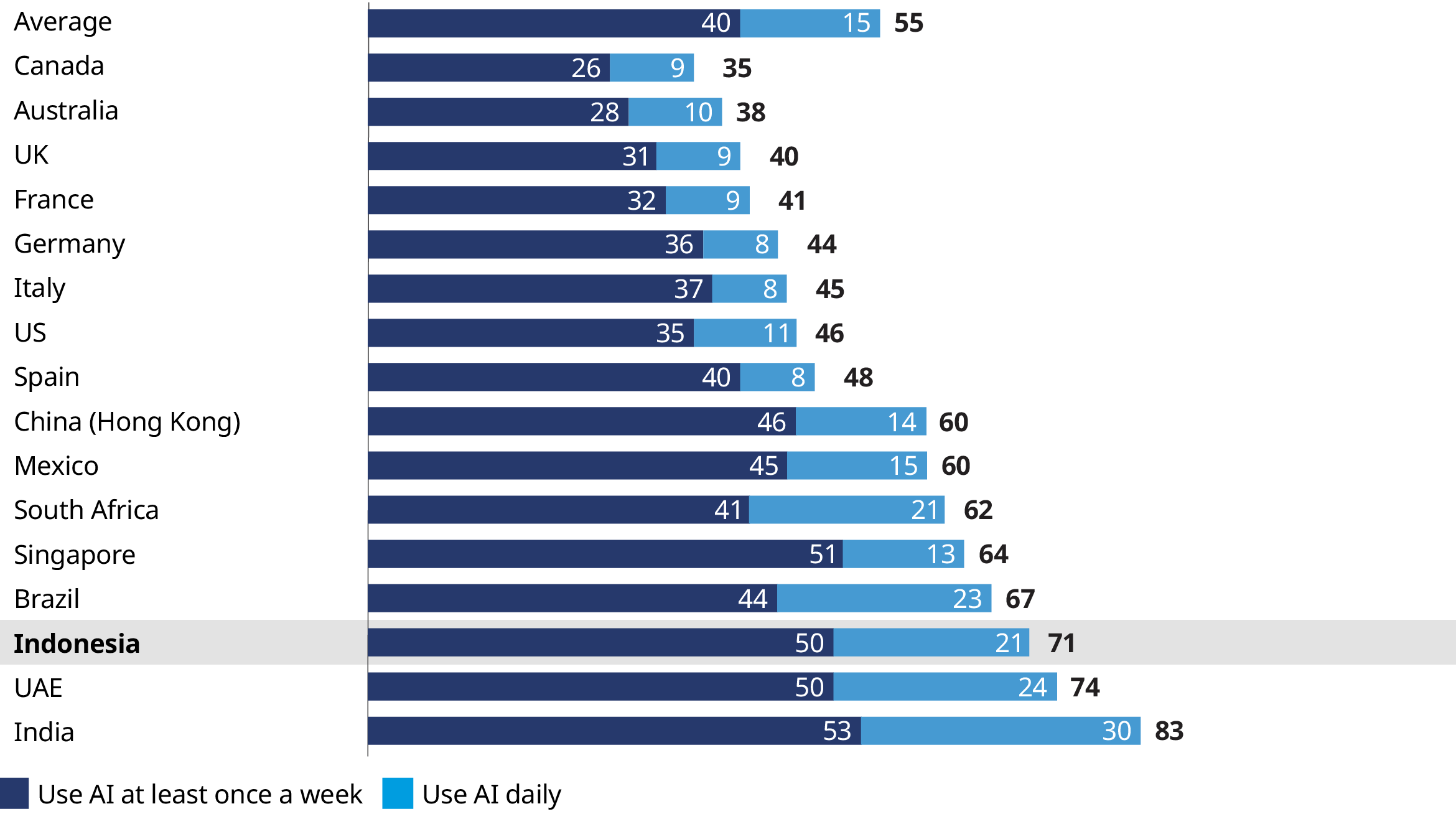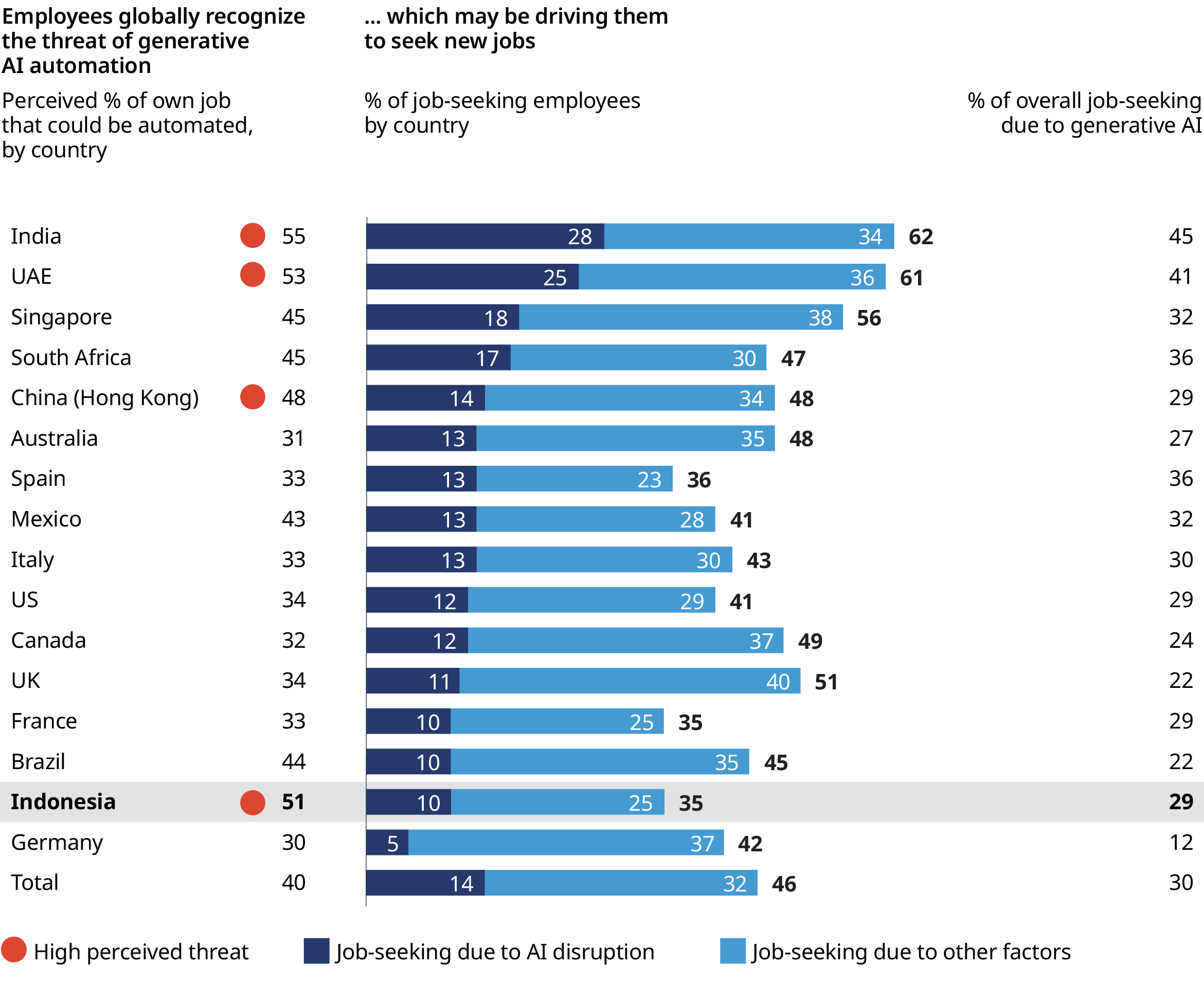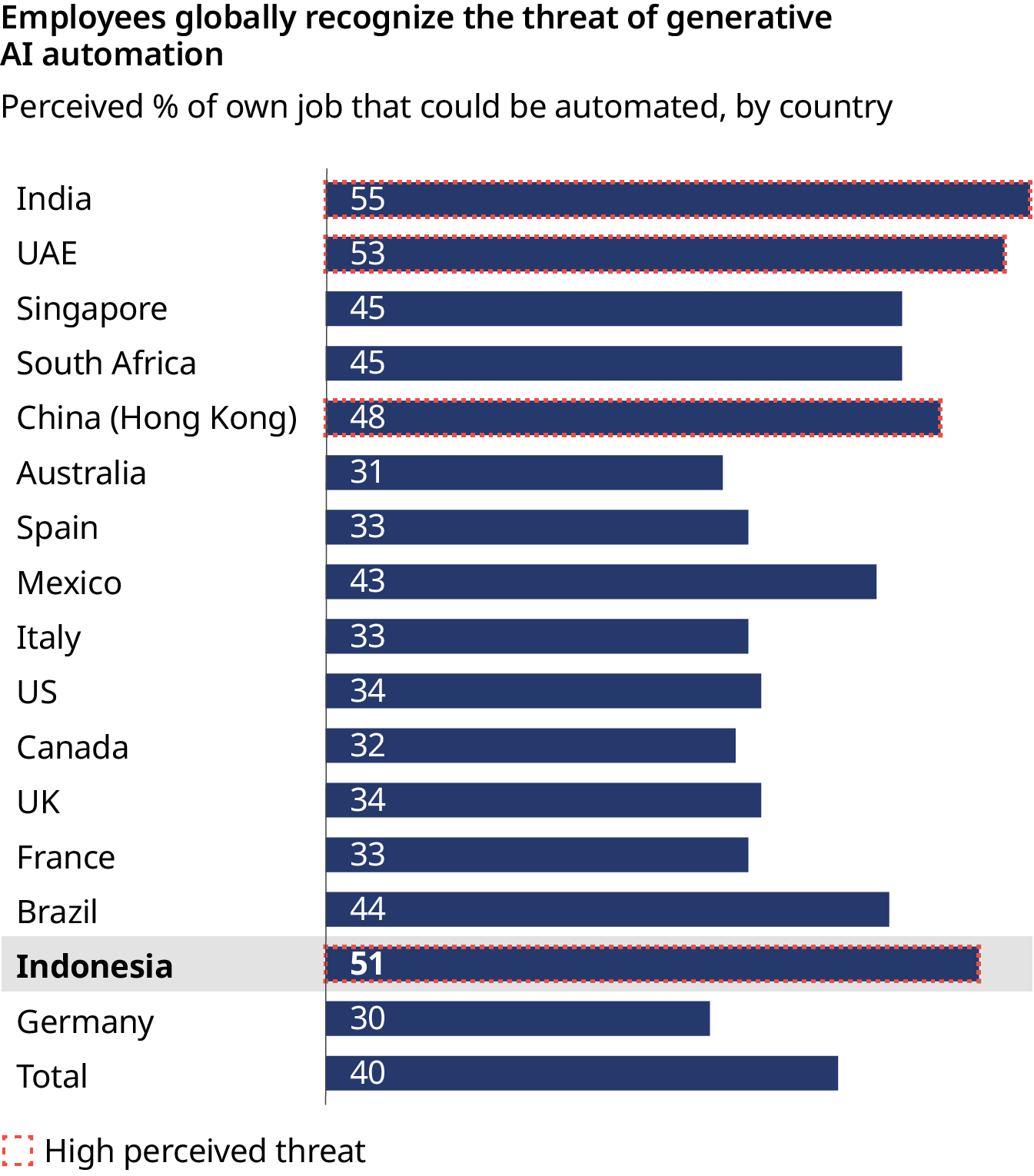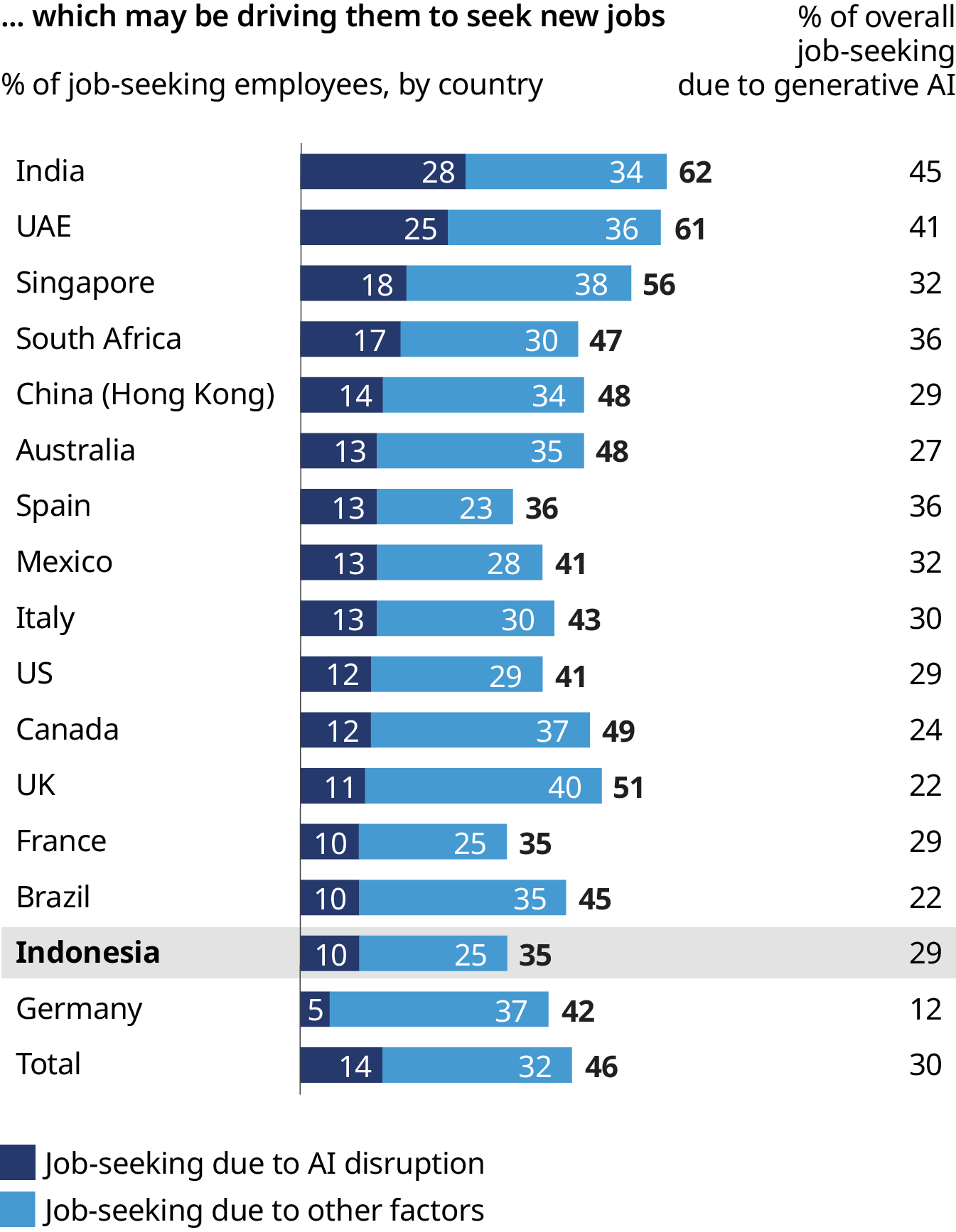Hefty foreign investments are significantly bolstering Indonesia’s efforts to become a regional force in the development of new technologies such as artificial intelligence (AI). In April 2024, US technology firm Nvidia, in partnership with Indonesia’s telco PT Indosat, announced plans to invest $200 million in the construction of an AI center and the necessary human resource development in Surakarta. This was followed by news that Microsoft would commit $1.7 billion to build new cloud and AI infrastructure, and to upskill 840,000 Indonesians.
Continued investments like these are vital to fostering innovation-based growth in a country that currently lacks an overarching regulatory framework and clear guidelines on the use and mandated training of AI across sectors. The promise by technology giants to invest and upskill Indonesians, however, will need to be backed by a commitment from Indonesia’s government to prioritize AI legislation and provide additional educational offerings at the tertiary level to enable faster adoption by the country’s workforce.
Advancements in AI also raise the elephant in the room — arguably AI’s biggest impact is on improving workers’ efficiency and productivity by removing repetitive tasks, but this directly affects numerous unskilled or semi-skilled jobs. As the fourth most populous nation in the world, and one that has made great gains in poverty reduction in recent years, Indonesia will need to strike a delicate balance in how it decides to implement AI.
Addressing Indonesia’s lack of an overarching AI strategy
The Indonesian government has ongoing plans to streamline bureaucracy around external investments. More specifically on the AI front, the government’s National Strategy on AI 2020–2045 and its promise to issue AI regulations by end of 2024 will greatly help the country advance AI across its key sectors.
Indonesia is already seeing a surge in use cases across diverse industries, such as financial services, retail and consumer goods, and media and communications. In education, for instance, players are employing AI with broad success by customizing lessons for individual students and providing personalized tutoring. The country’s wider business sectors are also showing signs of steady AI adoption, with 50% of employees in Indonesia already using AI weekly, while 21% use it daily in their jobs across multiple business priorities.

However, Indonesia’s lack of an overarching institutional AI strategy is preventing AI from multiplying its benefits to the mainstream. Use cases are often still at a fundamental level, and center mostly on customer service, where AI is used to answer simple customer questions and resolve basic queries. While some financial institutes are experimenting with new AI-powered app-based banking products and services, these are generally still in their infancies.
How AI can boost Indonesia’s productivity and operations
One advantage to Indonesia’s relatively slow adoption thus far is that it can observe the rapid advancements in AI — both predictive and generative — from other parts of the world and choose which best practices to adopt and what use cases to replicate based on innovations that have already proven their ability to drive value.
Financial services in Indonesia, for example, could use generative AI to automate routine tasks such as market research and report generation, accelerate ideation, and enhance risk analysis and customization, resulting in increased productivity, faster time to market, and improved sales and customer experiences. Our study with Morgan Stanley estimates that 60% of new product approval documentations can be generated this way, and that generative AI could provide a 60% faster response time on prioritized client requests for sales managers.
More broadly, companies seeking to bolster productivity and operations could focus on AI to improve employee efficiency, such as through knowledge management of internal documentation and employee resources, or by functioning as a “co-pilot”, either for technology teams when developing code or for customer service teams to answer queries quickly.
Within insurance, several global companies are already using AI for smart claims management to reduce the costs associated with claims and improve customer experience. Typically, using AI to remove incomplete or false claims could result in a 10% to 15% cost savings and reduce duplicate work for operations teams.
Indonesia’s healthcare sector, meanwhile, could replicate global examples where large language models (LLM) are being used to digitize patient records for easy-to-access histories, which not only reduces costs but also increases doctors’ effectiveness in diagnosing patients.
As it stands, Indonesia is already seeing an increase in predictive AI use, including machine learning models (MLM) in financing and lending, which are ubiquitous across incumbent banks, digital banks, and multi-finance players. Based on our analysis, the use of machine learning credit models is improving the accuracy of loan underwriting by 10% to 15%, and reducing costs associated with reviewing loan documents and underwriting operations by 5% to 10%.
Mitigating cyber risks and fraud through AI
While such new technologies come with a multitude of advantages, such as AI’s ability to analyze vast amounts of data, it has opened the door to unscrupulous actors who access the same data for fraudulent uses. Here, again, Indonesia can look to the world for best practices in mitigating these risks. Numerous international organizations, for example, have begun actively deploying generative AI tools to improve their fraud monitoring and cyber risk controls by predicting irregular actions before they take place.
Major global banks are also developing highly specific AI models for fraud and scam detection and prevention. This extends to insurers who use these models to identify sophisticated insurance claims fraud. When it comes to financial transactions, Indonesia is already seeing improved fraud detection by using AI to contextualize transactions and develop fraud tests and red-flag markers. We have seen how this helps reduce costs associated with fraud management by up to 5%.
Identifying persistent challenges to AI adoption in Indonesia
While Indonesia continues to explore promising areas of AI adoption, fundamental challenges remain. When it comes to energy considerations, data centers, cryptocurrencies, and AI combined used 460 terawatt-hours of electricity worldwide in 2022, almost 2% of total global electricity demands. Various studies have shown that each request made to ChatGPT uses roughly 10 times the power of a single Google search. With firms rushing to pack their products with AI, total AI use could become a significant drain on energy resources in the future. Although Indonesia currently has ample energy reserves, how to allocate these sources of energy smartly, balancing between propelling real economy and driving innovation, will be the key strategic question.
Another challenge lies in the sporadic and imperfect nature of available data for AI to tap into. For example, Indonesia’s information on small and medium enterprises (SMEs) is spread across 20-plus government departments, which can lead to data issues. AI models are only as good as the data they are fed and trained on — unless Indonesia’s fundamental data problems are improved, it will be difficult for AI to reach its true potential.
An additional consideration is the effective control and ethical use of AI. To achieve this, Indonesia will need to reliably establish AI governance guidelines and risk management guardrails. Clear guidelines on the use of AI and its specific purposes need to be well thought through. Indonesia has started taking the right steps by, for instance, issuing general guidelines in 2023 on the ethical use of AI, but more detailed and specific guidance in the form of ministerial regulation is still under review.
Striking a balance between AI and traditional growth industries
Indonesia is a rapidly developing country, and one with notable aspirations. Its consistent growth in recent years has been based on a strategy of not always following in the footsteps of its neighbors.
When it comes to the adoption of AI, the promise of increased productivity that comes at the inevitable expense of jobs for a large portion of the workforce is a major consideration. The perceived threat among Indonesians of losing their jobs to AI is high, and as a populous country, job availability and stability are priorities.
The question for Indonesia, then, is how to position itself to best benefit from the wave of AI. Should it double down on developing an AI-based economy, or should it take a more cautious approach anchored on the continued growth of its non-AI-based economy?
The answer likely lies in balance and selectivity. It will not work to force-fit AI into all industries in Indonesia, and a heavy-handed approach by the government would likely create consternation among its population with detrimental results. At the same time, neglecting to position Indonesia at the forefront of AI trends would reduce the country’s competitiveness on the global stage.
Indonesia will need to cherry-pick the industries that are best positioned to benefit from AI and take a highly targeted but multistage approach to its implementation. To achieve this, the government will need to ensure the necessary policies and incentives are in place to support these growth ambitions.
While it is unlikely Indonesia will adopt pioneering innovations such as self-driving cars or robotic crop harvesters soon, the country will likely benefit from a considered adoption of AI in areas such as healthcare, where it can be used to improve patient care, or the financial sector, where it could help streamline loan underwriting or insurance claims. The role of AI in Indonesia’s new era requires a balanced adoption that does not replace jobs but rather augments traditional, human-based methods while driving targeted innovation in specific areas.




